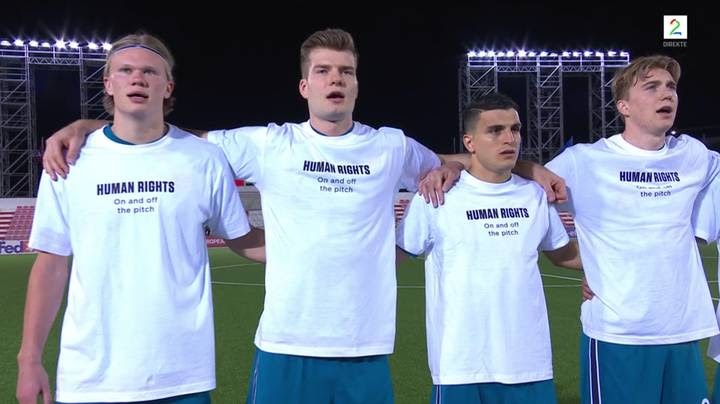At the time of writing, there are 608 days left for the 2022 FIFA World Cup in Qatar. There was controversy even during FIFA’s initial decision to award host status to the Middle Eastern country in December 2010, and criticism has, with good reason, only grown in magnitude since then. Reports of human rights violations and migrant labourers being forced to work in atrocious conditions have received wide publicity in the lead up to the world’s biggest sporting event. Earlier this year, the Guardian estimated that more than 6500 migrant workers from India, Pakistan, Nepal, Bangladesh and Sri Lanka have died in Qatar since December 2010. Another report by Amnesty International cites several issues that many migrant labourers in Qatar are forced to confront. These include terrible living conditions, wage problems and forcible detention in the country by employers. While calls to boycott the tournament have been made by fans and clubs alike, there has been a notable lack in public statements or stands made by players participating in the tournament. Many footballers who are aware of the situation unfolding in Qatar are likely to face some degree of moral conflict or external pressure whether or not to use their reach to advocate change, or even a complete boycott. The risk of losing one’s place in the team, being restricted from speaking out by sponsor companies, the influence of PR teams, football organizations and countries present several possible explanations for the relatively low amount of condemnation that the tournament has received from players.
Players are the most visible part of a World Cup. Apart from being the carefully selected group to represent a country, they are also the most marketable part of the World Cup, and hence, subject to utmost scrutiny. However, should players be carrying any sort of moral burden?
Although they are a fundamental part of the tournament, they are independent of the operations and decision making processes of FIFA and its political and commercial partners. The highest governing authority on football should be held more accountable for not only granting Qatar the rights for the World Cup, but also failing to ensure more stringent rules and directives. FIFA’s complicitness in Qatar exploiting its labourers points at the need for drastic structural change. There have been several accusations against the organisation that it took bribes to allow Qatar to host the tournament. Former FIFA President Sepp Blatter, who is serving a ban from FIFA-related activities following a separate scandal of his own in 2015, wrote in his book Ma Verite, that FIFA executive committee (Exco) members chose to disregard advice that Qatar would not be able to host a World Cup, and that “he alleges Qatar’s shock victory was a combination of a rule-breaking collusion deal and political pressure exerted on Michel Platini, the French Exco member”. With the multiple political and diplomatic layers shrouding the World Cup behind endless trails of scattered bureaucracy, it is unlikely that significant structural changes will take place before 21 November, 2022. The route that FIFA seems to have taken is one of deflecting attention until then, in the hopes that the glamour of the first World Cup to take place in the Middle East (and only the second in Asia) will outshine the tournament’s corrupt foundations.
Some nations and players have chosen to publicly take objection with the events in Qatar on their own accord. Norway coach Staale Solbakken said that his team was planning to use a special gesture to raise awareness about migrant labour conditions in their first fixture against Gibraltar. In 2016, two Dutch players, Tom Hogli and William Kvist , who signed with FC Copenhagen in Denmark, spoke out regarding the same issue. Riku Risi, a Finnish striker, boycotted a collective tour with Sweden and Iceland in January 2019 due to “ethical concerns”, despite putting his place in the team at risk in choosing to do so. Yet, not all players and others associated with the game on the ground level share the same sentiments. Footballing legend Zlatan Ibrahimovic stated in a recent interview that “A football player will play in the World Cup no matter what. Whatever happens off the pitch is not up to me”. Former Barcelona superstar Xavi Hernandez, who is currently the manager of Al-Sadd in Qatar, has emerged in favour of hosting the World Cup there, mainly due to the country’s small size and subsequent lack of travel time between venues. His personal stakes in Qatari football, alongside the fact that he will be an official ambassador for the World Cup could mean that he is virtually unable to raise any grievances against Qatar or FIFA due to the implications for his career. Or, like Ibrahimovic, he could be detached from the various causes for concern associated with the tournament and simply wish to focus on football instead.
It is evident that players who wish to publicize their opinions must take into consideration the effect it will have on their market values, commercial deals and position within the team, and not to mention, their chances of representing their country. Showing signs of solidarity at the tournament or even boycotting it entirely can only be part of a short-term solution— it would take a great deal of movement in a short time-frame before it starts, for any kind of drastic change in either Qatar or FIFA. For now, it seems like FIFA is counting on the worldwide spectatorship and footballing glory that the World Cup brings with it every four years to supersede the magnitude of their mistakes.
Shourjo Chatterjee is a 4th year undergraduate student at Ashoka University studying English Literature and International Relations. In his free time you’ll find him drumming and reading novels.
We publish all articles under a Creative Commons Attribution-Noderivatives license. This means any news organisation, blog, website, newspaper or newsletter can republish our pieces for free, provided they attribute the original source (OpenAxis).

